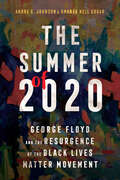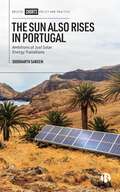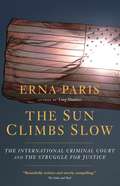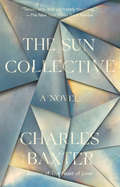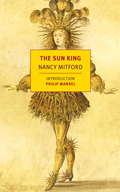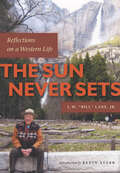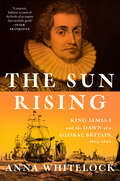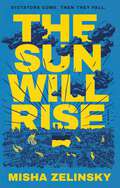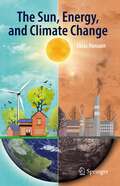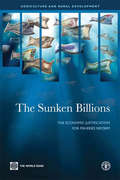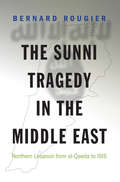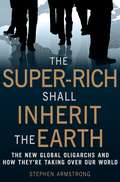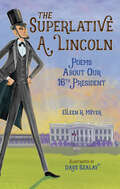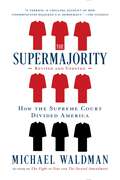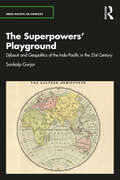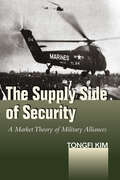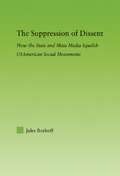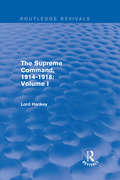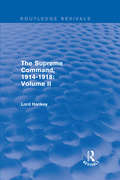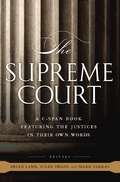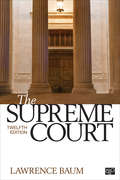- Table View
- List View
The Summer of 2020: George Floyd and the Resurgence of the Black Lives Matter Movement (Race, Rhetoric, and Media Series)
by Andre E. Johnson Amanda Nell EdgarIn the wake of George Floyd’s murder in May 2020, protests broke out in Minneapolis and quickly spread across the United States. National unrest led to the resurgence of the Black Lives Matter movement and added to calls for justice in other American cities, including Los Angeles, Atlanta, Tulsa, and Louisville, Kentucky, where only months earlier, Breonna Taylor was killed by police. By some estimates, BLM protesters numbered between fifteen million and twenty-six million in the US and abroad. The Summer of 2020: George Floyd and the Resurgence of the Black Lives Matter Movement spotlights the perspectives of individual participants who contributed to the movement’s revived impact and global success throughout 2020. Authors Andre E. Johnson and Amanda Nell Edgar interview the movement’s activists—from seasoned organizers to first-time protesters—to discover what Black Lives Matter meant to those who participated in one of America’s largest social movements. Johnson and Edgar’s fieldwork reveals the complexity of taking a stand, especially in the face of increasing threats from white supremacist groups, continuing police aggression, and a persisting global pandemic. In a time with unprecedented levels of political polarization, the wave of support for the Black Lives Matter movement powerfully disrupted that expectation. Without a clear sense of what led to the surge in support for Black Lives Matter, racial justice advocates are left ill-equipped to maintain and harness the political momentum necessary to achieve lasting equity and justice. In delving beyond a conventional focus on leaders and figureheads, this volume bolsters social movement research by accounting for the increasing numbers of Black Lives Matter supporters and demonstrators and the lasting power of their message.
The Sun Also Rises in Portugal: Ambitions of Just Solar Energy Transitions
by Siddharth SareenAvailable open access digitally under CC-BY licence. Portugal is among the best-placed European countries to take advantage of solar power, having achieved a five-fold increase in installed capacity during 2017-2023 despite financial constraints. In 2023, its National Energy and Climate Plan set an ambitious target for a further eight-fold increase from 2.5 GW to 20.4 GW by 2030. How can such fast-paced deployment secure sociospatial justice? What insights do political economic dynamics hold for future transitions? Drawing on long-term, multi-sited ethnographic fieldwork, this book is a one-stop resource for policy makers, practitioners, scholars, and anyone interested in just solar energy transitions. Siddharth Sareen won the 2024 Nils Klim Prize, recognising his exemplary work in the search for renewable and sustainable sources of energy.
The Sun Climbs Slow: The International Criminal Court and the Struggle for Justice
by Erna ParisIn this groundbreaking investigation, Erna Paris explores the history of global justice, the politics behind America's opposition to the creation of a permanent international criminal court, and the implications for the world at large.The International Criminal Court (ICC) is the first permanent tribunal of its kind. The mandate of the ICC is to challenge criminal impunity on the part of national leaders and to promote accountability in world affairs at the highest level. Independent and transnational, its indictments cannot be vetoed in the Security Council.On March 11, 2003, when the new court was inaugurated in a moving ceremony, attended by over half of the countries in the world, one country was conspicuously missing from the celebrations. The government of the United States had made it clear that the International Criminal Court was not consistent with American goals and values.
The Sun Collective: A Novel
by Charles BaxterFrom the National Book Award finalist and &“one of our most gifted writers&” (Chicago Tribune)—a timely and unsettling novel about the people drawn to and unmoored by a local activist group more dangerous than it appears Once a promising actor, Tim Brettigan has gone missing. His father thinks he may have seen him among some homeless people. And though she knows he left on purpose, his mother has been searching for him all over the city. She checks the usual places—churches, storefronts, benches—and stumbles upon a local community group with lofty goals and an enigmatic leader who will alter all of their lives. Christina, a young woman rapidly becoming addicted to a boutique drug that gives her a feeling of blessedness, is inexplicably drawn to the same collective by a man who&’s convinced he may start a revolution. As the lives of these four characters intertwine, a story of guilt, anxiety, and feverish hope unfolds in the city of Minneapolis. A vision of modern American society and the specters of the consumerism, fanaticism, and fear that haunt it, The Sun Collective captures both the mystery and the violence that punctuate our daily lives.
The Sun King
by Nancy Mitford Philip ManselThe Sun King is a dazzling double portrait of Louis XIV and Versailles, the opulent court from which he ruled. With characteristic élan, Nancy Mitford reconstructs the daily life of king and courtiers during France's golden age, offering vivid sketches of the architects, artists, and gardeners responsible for the creation of the most magnificent palace Europe had yet seen. Mitford lays bare the complex and deadly intrigues in the stateroom and the no less high-stakes power struggles in the bedroom. At the center of it all is Louis XIV himself, the demanding, mercurial, but remarkably resilient sovereign who guided France through nearly three quarters of the Grand Siècle.Brimming with sumptuous detail and delicious bons mots, and written in a witty, conversational style, The Sun King restores a distant glittering century to vibrant life.tail and delicious bons mots, and written in a witty, conversational style The Sun King restores a distant glittering century to vibrant life.
The Sun Never Sets: Reflections on a Western Life
by L. W. Bill" Lane Jr.The Sun Never Sets tells the extraordinary story of L.W. "Bill" Lane, Jr., longtime publisher of Sunset magazine, pioneering environmentalist, and U.S. ambassador. Written with Stanford historian Bertrand Patenaude, this fascinating memoir traces Sunset's profound impact on a new generation of Americans seeking opportunity and adventure in the great American West. Bill Lane was a Californian whose life spanned a vital period of the state's emergence as the embodiment (or symbol) of the country's aspirations. His recollections offer readers a rich slice of the history of California and the West in the 20th century. Recounting his boyhood move from Iowa to California after his father purchased Sunset magazine in 1928, and his subsequent rise through the ranks of Sunset, Bill Lane's memoir evokes the American West that his magazine helped to shape. It illuminates the sources of Sunset's canny appeal and its manifold influence in the four major editorial fields it covered--travel, home, gardening, and cooking--while taking readers behind the scenes of American magazine publishing in the 20th century. The Sun Never Sets also reveals the evolution of Bill Lane's views and roles as an influential environmentalist and conservationist with strong connections to the national and California state parks, and it recounts his two stints as U.S. ambassador: in Japan in the 1970s, and in Australia in the 1980s. This memoir will especially appeal to readers interested in the history of the American West, environmental conservation and preservation, and publishing.
The Sun Rising: King James I and the Dawn of a Global Britain, 1603-1625
by Anna WhitelockA gripping and thought-provoking account of the reign of King James I, who united Britain and made England the global power we know today.The British monarchy of today descends directly from one leader: King James I, whose huge—and much overlooked—influence launched England as a major international trade power, established the King James Bible, and united the royal families of Scotland and England under one house and one monarch.Along with his wife, Anna of Denmark, and his children—Henry, Elizabeth, and Charles—James sought to broker agreements between the warring Catholic and Protestant princes in Europe and establish an era of peace. Instead, James set the groundwork for his children to grow up and champion a militant Protestantism that plunged the entire continent into religious war.At his ascension, England was economically behind, but James's global ambitions began to shift the tide: As ships departed London for America, Russia, Persia, India, and Japan, the fledgling East India Company began to intertwine ever closer with the crown.And James himself was dogged by scandal, running a court famously reputed for vice and venality. But his court was also rich in art, drama, and literature. Shakespeare's King Lear and Macbeth—said to have been inspired by James himself—were both first performed at the Jacobean court.Set across England and the Continent, over the course of twenty years—beginning with the death of Elizabeth I in 1603 and the ascension of James I and ending in 1625 with Charles I becoming king—The Sun Rising presents a rich and compelling portrait of the royal family and a story of dynastic power politics, which ultimately and viciously split Europe.
The Sun Will Rise
by Misha ZelinskyInspired by true events, The Sun Will Rise by Misha Zelinsky honors those bravely fighting and dying for their freedom in Ukraine.Oksana Shevchenko remembers life as it once was. Before the War. Before the Invaders stripped her freedom away. Before the Motherland decided to take what wasn&’t hers, and call it her own. As the leader of the local Union, thirty-one-year-old Oksana has met her match in enemy officer Lieutenant General Mikhailovich, who will stop at nothing to win glory for the Motherland—and himself. After he captures the city of Heryvin, the young, ambitious Mikhailovich forces Oksana and her Union comrades to operate the local nuclear power plant for the Motherland&’s gain, while sapping its capacity to operate safely. It&’s a nightmare for a city still reeling from the disastrous accident that took the lives of dozens—including Oksana&’s father—decades before. Caught between her loyalty to those resisting the Occupation and a nuclear catastrophe threatened by increasingly impossible orders, Oksana must find a way to defeat Mikhailovich before his sadistic determination leads him to doing the unthinkable. But Oksana might not be alone in her fight, because war makes heroes out of the ordinary and unlikely. A grandmother defiantly waving the colour of her nation. A principal offering a safe haven for students dreaming of brighter futures. A young adult choosing courage in the face of mortal danger. A country quietly showing that glory belongs to those who dare to hold on against impossible odds. Because one day soon, the sun will set on dictators. And the sun will rise on freedom once again. Inspired by true events in Ukraine, The Sun Will Rise is a tribute to those bravely fighting for their freedom—and ours.
The Sun, Energy, and Climate Change
by Eklas HossainThe Sun, Energy, and Climate Change conveys one central idea – that we can utilize energy without continuing to harm the planet by increasing our reliance on energy from the sun. This accessible guide stresses the sun’s importance as our ultimate energy source by focusing on climate change from an energy perspective and explains the naturally balanced energy transfer from the sun to the earth and society’s consumption of this energy. This book is for anyone worried about environmental damage from our reliance on fossil fuels and the global fight against climate change. The key message being we do not have to accept the inevitable and can work to prevent the worst.
The Sunken Billions: The Economic Justification for Fisheries Reform
by Kieran Kelleher Rolf Willmann Ragnar Arnason'The Sunken Billions: The Economic Justification for Fisheries Reform' shows the difference between the potential and actual net economic benefits from marine fisheries is about $50 billion per year, or some $2 trillion over the last three decades. If fish stocks were rebuilt, the current marine catch could be achieved with approximately half the current global fishing effort. This illustrates the massive overcapacity of the global fleet. The excess competition for the limited fish resources results in declining productivity, economic inefficiency, and depressed fisher incomes. The focus on the deteriorating biological health of world fisheries has tended to obscure their equally critical economic health. Achieving sustainable fisheries presents challenges not only of biology and ecology, but also of managing political and economic processes and replacing pernicious incentives with those that foster improved governance and responsible stewardship. Improved governance of marine fisheries could regain a substantial part of this annual economic loss and contribute to economic growth. Fisheries governance reform is a long-term process requiring political will and consensus vision, built through broad stakeholder dialogue. Reforms will require investment in good governance, including strengthening marine tenure systems and reducing illegal fishing and harmful subsidies. Realizing the potential economic benefits of fisheries means reducing fishing effort and capacity. To offset the associated social adjustment costs, successful reforms should provide for social safety nets and alternative economic opportunities for affected communities.
The Sunni Tragedy in the Middle East
by Bernard RougierNorthern Lebanon is a land in turmoil. Long under the sway of the Assad regime in Syria, it is now a magnet for Sunni Muslim jihadists inspired by anti-Western and anti-Shi'a worldviews. The Sunni Tragedy in the Middle East describes in harrowing detail the struggle led by an active minority of jihadist militants, some claiming allegiance to ISIS, to seize control of Islam and impose its rule over the region's Sunni Arab population.Bernard Rougier introduces us to men with links to the mujahidin in Afghanistan, the Sunni resistance in Iraq, al-Qaeda, and ISIS. He describes how they aspire to replace North Lebanon's Sunni elites, who have been attacked and discredited by neighboring powers and jihadists alike, and explains how they have successfully positioned themselves as the local Sunni population's most credible defender against powerful external enemies--such as Iran and the Shi'a militia group Hezbollah. He sheds new light on the methods and actions of the jihadists, their internal debates, and their evolving political agenda over the past decade.This riveting book is based on more than a decade of research, more than one hundred in-depth interviews with players at all levels, and Rougier's extraordinary access to original source material. Written by one of the world's leading experts on jihadism, The Sunni Tragedy in the Middle East provides timely insight into the social, political, and religious life of this dangerous and strategically critical region of the Middle East.
The Super-Rich Shall Inherit the Earth: The New Global Oligarachs and How They're Taking Over our World
by Stephen ArmstrongIn 2000 No Logo described a vision of rapacious corporations building brands at the expense of impoverished third world employees and ripped-off first world consumers. Now, only eight years later, No Logo looks almost optimistic against the rise of a new and insidious club of global billionaires who are buying up once unfashionable industries like oil, steel, shipping and mining from distressed third-world nations and formerly Communist powers. Often backed by mafia money or dubious political connections, these oligarchs have no shareholders and no home nation - they are the sum total of their corporations. We are dependent on these men - they fuelled our recent boom. They come to us for our light taxation and our willingness to sell them class and influence via an Eton education for their kids and cheaply bought honours. These men are becoming ever richer as the rest of the world suffers credit crunch and recession. They deal in the commodities that the planet's economies need but which are becoming ever more scarce. There are no national governments that can control or legislate against them - they will simply move to another of their five or six palatial homes.In this recession, we are all acutely aware of our dwindling wealth and the spiralling prices of essentials. The fact that these are in fewer and nastier hands than ever before has rarely - if ever - been explained by the media. It's time for a book that points out the power of these individuals and how they are just the start of a deeply worrying trend. The buyers of Tescopoly and No Logo have long been aware of overly powerful corporations. The rise of men whose personal wealth and power far outranks most of the companies in these books should alarm these concerned citizens - and encourage them to find out more. This book will paint a vivid picture using interviews, first hand experience, expert comment and some futurology to give them the information they need.
The Super-Rich Shall Inherit the Earth: The New Global Oligarachs and How They're Taking Over our World
by Stephen ArmstrongIn 2000 No Logo described a vision of rapacious corporations building brands at the expense of impoverished third world employees and ripped-off first world consumers. Now, only eight years later, No Logo looks almost optimistic against the rise of a new and insidious club of global billionaires who are buying up once unfashionable industries like oil, steel, shipping and mining from distressed third-world nations and formerly Communist powers. Often backed by mafia money or dubious political connections, these oligarchs have no shareholders and no home nation - they are the sum total of their corporations. We are dependent on these men - they fuelled our recent boom. They come to us for our light taxation and our willingness to sell them class and influence via an Eton education for their kids and cheaply bought honours. These men are becoming ever richer as the rest of the world suffers credit crunch and recession. They deal in the commodities that the planet's economies need but which are becoming ever more scarce. There are no national governments that can control or legislate against them - they will simply move to another of their five or six palatial homes.In this recession, we are all acutely aware of our dwindling wealth and the spiralling prices of essentials. The fact that these are in fewer and nastier hands than ever before has rarely - if ever - been explained by the media. It's time for a book that points out the power of these individuals and how they are just the start of a deeply worrying trend. The buyers of Tescopoly and No Logo have long been aware of overly powerful corporations. The rise of men whose personal wealth and power far outranks most of the companies in these books should alarm these concerned citizens - and encourage them to find out more. This book will paint a vivid picture using interviews, first hand experience, expert comment and some futurology to give them the information they need.
The Superlative A. Lincoln: Poems About Our 16th President
by Eileen R. MeyerTallest, wisest, most studious--Lincoln was simply superlative!Get to know the personal side of Honest Abe (his LEAST FAVORITE nickname) through fresh and funny poems expressing his superlative nature. Abraham Lincoln is famous for many extremes: he was the TALLEST president, who gave the GREATEST SPEECH and had the STRONGEST conviction. But did you know that he was also the MOST DISTRACTED farmer, the BEST wrestler, and the CRAFTIEST storyteller? Nineteen poems share fascinating stories about events in Lincoln's life, while history notes go even deeper into how he excelled. Don't forget to think of all the ways you, too, are superlative!
The Supermajority: How the Supreme Court Divided America
by Michael WaldmanA &“terrific, if chilling, account&” (The Guardian) of how the Supreme Court&’s new conservative supermajority is overturning decades of law and leading the country in a dangerous political direction.In The Supermajority, Michael Waldman explores the tumultuous 2021–2022 Supreme Court term. He draws deeply on history to examine other times the Court veered from the popular will, provoking controversy, and backlash. And he analyzes the most important new rulings and their implications for the law and for American society. Waldman asks: What can we do when the Supreme Court challenges the country? Over three days in June 2022, the conservative supermajority overturned the constitutional right to abortion, possibly opening the door to reconsider other major privacy rights, as Justice Clarence Thomas urged. The Court sharply limited the authority of the EPA, reducing the prospects for combatting climate change. It radically loosened curbs on guns amid an epidemic of mass shootings. It fully embraced legal theories such as &“originalism&” that will affect thousands of cases throughout the country. These major decisions—and the next wave to come—will have enormous ramifications for every American. It was the most turbulent term in memory—with the leak of the opinion overturning Roe v. Wade, the first Black woman justice sworn in, and the justices turning on each other in public, Waldman previews the 2022–2023 term and how the brewing fights over the Supreme Court and its role that already have begun to reshape politics. The Supermajority is &“a call to action as much as it is a history of the Supreme Court &“ (Financial Times) at a time when the Court&’s dysfunction—and the demand for reform—are at the center of public debate.
The Superpowers’ Playground: Djibouti and Geopolitics of the Indo-Pacific in the 21st Century (Indo-Pacific in Context)
by Sankalp GurjarThis book analyses the evolving geopolitics in the Indo-Pacific region and explains how Djibouti fits in the global strategies of four major powers—the US, China, Japan, and France. It shows how Djibouti is emerging as a key nation in the geopolitics of the Indo-Pacific, explores the interconnections between Djibouti and the Indian as well as Pacific Oceans, and through Djibouti examines broader trends in contemporary great power politics in the Indo-Pacific region, including the Belt and Road Initiative of China. Moving beyond contemporary works on the region, the author integrates Africa and the Middle East with discussions on the Indo-Pacific to illustrate the coalescing of strategic geography from Eastern Africa to the Western coast of the Americas. A major intervention, the volume will be essential reading for scholars, practitioners, and researchers of politics and international relations, security studies, African studies, peace and conflict studies, and maritime studies.
The Supply Side of Security: A Market Theory of Military Alliances
by Tongfi KimThe Supply Side of Security conceptualizes military alliances as contracts for exchanging goods and services. At the international level, the market for these contracts is shaped by how many countries can supply security. Tongfi Kim identifies the supply of policy concessions and military commitments as the main factors that explain the bargaining power of a state in a potential or existing alliance. Additionally, three variables of a state's domestic politics significantly affect its negotiating power: whether there is strong domestic opposition to the alliance, whether the state's leader is pro-alliance, and whether that leader is vulnerable. Kim then looks beyond existing alliance literature, which focuses on threats, to produce a deductive theory based on analysis of how the global power structure and domestic politics affect alliances. As China becomes stronger and the U.S. military budget shrinks, The Supply Side of Security shows that these countries should be understood not just as competing threats, but as competing security suppliers.
The Suppression of Dissent: How the State and Mass Media Squelch USAmerican Social Movements (New Approaches in Sociology)
by Jules BoykoffDespite longstanding traditions of tolerance, inclusion, and democracy in the United States, dissident citizens and social movements have experienced significant and sustained - although often subtle and difficult-to observe - suppression in this country. Using mechanism-based social-movement theory, this book explores a wide range of twentieth century episodes of contention, involving such groups as mid-century communists, the Black Panther Party, the American Indian Movement, and the modern-day globalization movement.
The Supreme Command, 1914-1918: Volume I (Routledge Revivals)
by Lord HankeyLord Hankey (1877-1963) was a British civil servant and the first Cabinet Secretary, a top aide to Prime Minister David Lloyd George and the War Cabinet that directed Britain in World War One. Mostly derived from the author’s diaries, which begin in March 1915, this study describes how Lord Hankey contributed to the development of the British system of Cabinet Government during the war years. First published in 1961, the two-volume collection is a history of the Supreme Command of the War; the conduct of the war, the development of the Supreme Command from Balfour to Lloyd George, and the emergence of the Cabinet Secretariat from the Secretariat of the War Cabinet. It contains intimate glimpses of the statesmen, sailors and soldiers who guided affairs towards 1918. This is a fascinating first-hand examination of the people who influenced the conduct of the war, and will be of particular value to students interested in its diplomatic history.
The Supreme Command, 1914-1918: Volume II (Routledge Revivals)
by Lord HankeyLord Hankey (1877-1963) was a British civil servant and the first Cabinet Secretary, a top aide to Prime Minister David Lloyd George and the War Cabinet that directed Britain in World War One. Mostly derived from the author’s diaries, which began in March 1915, this study describes how Lord Hankey contributed to the development of the British system of Cabinet Government during the war years. First published in 1961, the two-volume collection is a history of the Supreme Command of the War; the conduct of the war, the development of the Supreme Command from Balfour to Lloyd George, and the emergence of the Cabinet Secretariat from the Secretariat of the War Cabinet. It contains intimate glimpses of the statesmen, sailors and soldiers who guided affairs towards 1918. This is a fascinating first-hand examination of the people who influenced the conduct of the war, and will be of particular value to students interested in its diplomatic history.
The Supreme Court
by Brian Lamb Susan SwainThis singular collection of original interviews with all nine sitting Supreme Court justices plus retired Justice Sandra Day O'Connor--as well as reporters, attorneys, and historians--gives readers a rare window into the nation's highest court and those who serve there.
The Supreme Court
by Brian Lamb Susan Swain C-Span Mark FarkasThe Supreme Court grew out of a unique opportunity to interview all nine sitting Supreme Court Justices plus retired Justice O'Connor for a documentary on the Supreme Court. Through Brian Lamb and Susan Swain's interviews with our country's most influential judges, the book offers portraits of the Justices that introduces readers to the closed world of the Supreme Court, and what's it's really like to serve on the nation's highest Court.Accompanying the Justices around the Supreme Court, and through offices steeped in historic memorabilia, Lamb and Swain offer readers a window into a fascinating world to which few have had access. In these pages, Justice Sotomayor reflects on her first impressions of the job and the acclimation process. Justice Breyer takes us behind the scenes on a private tour of his Chambers as he describes how the Court works. And Chief Justice Roberts talks about the role of the Court in Society, the role of the Chief Justice, and the process of deciding cases.Enriching this unique material are interviews with journalists, court historians, and other experts on the Court. Journalists Joan Biskupic and Lyle Denniston (the longest serving Supreme Court reporter) talk about the process that unfolds in the Court and the impact of a new member of the Court. Clerk of the Supreme Court William Suter provides insights into the traditions of the Court. Historian Jim O'Hara discusses the Supreme Court building and its history. Two attorneys who have argued numerous cases in front of the Supreme Court tell readers what it's like facing the justices in fast paced oral arguments.Vividly illustrated with color photographs, the book is a perfect gift for anyone interested in the makings of this powerful institution.
The Supreme Court
by Brian Lamb Susan SwainThe Supreme Court grew out of a unique opportunity to interview all nine sitting Supreme Court Justices plus retired Justice O'Connor for a documentary on the Supreme Court. Through Brian Lamb and Susan Swain's interviews with our country's most influential judges, the book offers portraits of the Justices that introduces readers to the closed world of the Supreme Court, and what's it's really like to serve on the nation's highest Court. Accompanying the Justices around the Supreme Court, and through offices steeped in historic memorabilia, Lamb and Swain offer readers a window into a fascinating world to which few have had access. In these pages, Justice Sotomayor reflects on her first impressions of the job and the acclimation process. Justice Breyer takes us behind the scenes on a private tour of his Chambers as he describes how the Court works. And Chief Justice Roberts talks about the role of the Court in Society, the role of the Chief Justice, and the process of deciding cases. Enriching this unique material are interviews with journalists, court historians, and other experts on the Court. Journalists Joan Biskupic and Lyle Denniston (the longest serving Supreme Court reporter) talk about the process that unfolds in the Court and the impact of a new member of the Court. Clerk of the Supreme Court William Suter provides insights into the traditions of the Court. Historian Jim O'Hara discusses the Supreme Court building and its history. Two attorneys who have argued numerous cases in front of the Supreme Court tell readers what it's like facing the justices in fast paced oral arguments. Vividly illustrated with color photographs, the book is a perfect gift for anyone interested in the makings of this powerful institution.
The Supreme Court
by Lawrence A. BaumThe Supreme Court, Twelfth Edition, examines all major aspects of the highest court in the nation, from the selection of justices and agenda creation to the decision-making process and the Court’s impact on government and U.S. society. Delving deeply into personalities and procedures, author Lawrence Baum provides a balanced explanation of the Court’s actions and the behavior of its justices as he reveals its complexity, reach, and influence. This new edition gives particular attention to current developments such as the impact of political polarization on the Court, the justices’ increasingly public roles, and recent rulings on same-sex marriage and health care.
The Supreme Court
by Lawrence A. BaumThe Supreme Court, Twelfth Edition, examines all major aspects of the highest court in the nation, from the selection of justices and agenda creation to the decision-making process and the Court’s impact on government and U.S. society. Delving deeply into personalities and procedures, author Lawrence Baum provides a balanced explanation of the Court’s actions and the behavior of its justices as he reveals its complexity, reach, and influence. This new edition gives particular attention to current developments such as the impact of political polarization on the Court, the justices’ increasingly public roles, and recent rulings on same-sex marriage and health care.
